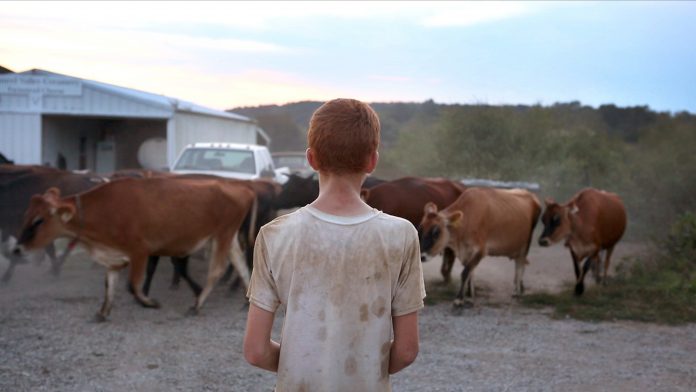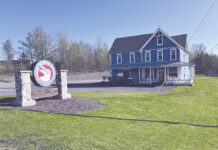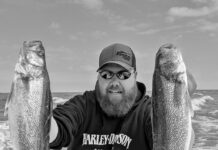
Shaena Mallett remembers the first time she met Nick Nolan, in 2010. She was living in Athens, Ohio, at the time. One day, she went to a farmers’ market. It was a typical frigid, slushy February day in Ohio.
Everyone else had retreated inside a mall — except for a man with a bright red beard and layers of Carhartts, selling homemade cheeses. “I just thought, ‘I have got to talk to that guy,’” Mallett told me. “He was just so full of joy.”
Becoming friends
A friendship was born. Mallett began spending time with Nolan and his wife, Celeste, and their children, on their grass-fed dairy farm, Laurel Valley Creamery, in Gallipolis, Ohio.
The Nolans were just getting their cheese business off the ground. “They were some of the people present in my life, when I was just getting back into farming,” Mallett told me in a recent interview. “They were doing it so wholeheartedly.”
From that friendship and Mallett’s deep interest in agriculture came Farmsteaders, set to air on PBS Sept. 2, at 10 p.m. It is part of the POV series, which showcases independent non-fiction films and filmmakers. Every year, POV premieres 14-16 new films.
Long project
Mallett spent about five years filming the Nolans. She and her husband, Chad A. Stevens, a producer, filmmaker and associate professor at University of North Carolina-Chapel Hill, edited the film. Originally, they funded the film with a Kickstarter crowd funding campaign, raising more than $13,000, with 198 donors.
The scenes threaded throughout are evocative. Of hazy summer evenings and early morning chores. Of never-ending farm work that tires you deep to the bone. Of childhoods lived outside, swinging sticks and helping dad put up hay. Of the pride you feel when someone tastes what you have made and deems it “delicious.” It is a portrait of what fewer families do on a daily basis now: work the land.

Honesty
“People think that they’re gambling when they go to a riverboat casino. Gambling’s putting everything on the line,” Nick Nolan mused in the film. “When you go out there every day, that’s what farming is, really.”
Mallett said they wanted to strike a balance. “… That’s something I wanted to be honest about with Farmsteaders — farming is beautiful and hard,” she said. “I wanted to share the perspective that hard isn’t bad, and in fact some of the most worthwhile endeavors we could possibly take on may also be the most difficult.”
Agriculture seems to be the topic du jour these days — for politicians, entertainers and well, everyone. That’s why Mallett’s storytelling struck me. It’s poignant without being pretentious.
Ohio raised
A native of southern Medina County, she grew up on a homestead, surrounded by farmland. In her teenage years, she watched that farmland dwindle. “It was really a microcosm of the state of family farms throughout America,” Mallett told me.
Mallett was in 4-H, showing meat birds, hogs and competing in showmanship. When she went to Ohio University, she studied photojournalism and anthropology. “I really thought that I was going to move far away from farming,” she said, but “I just couldn’t shake it.”
Now, Mallett and her husband purchased acreage in the foothills of the Blue Ridge Mountains. There were no buildings and no utilities. They are chipping away at it, one project at a time. The first thing they’re building? The barn.

“Farmers are heroes,” Mallett said. “I think farmers are some of the hardest working people that I have ever met. Consistently.” When we spoke, Mallett and I wrestled with solutions for an industry and a tradition that is facing tough times.
“Farming is a public service in many ways,” she said. “How do we fairly compensate farmers for doing the work, while also keeping the food accessible?” Spoiler: We didn’t figure it out. Not yet. Maybe it starts with the honest, unvarnished stories. The raw, and the beautiful, all rolled into one.
A powerful thing
Early in the film, Nick Nolan’s voice narrates. “Whenever somewhere has a hold of you, that’s kind of a powerful thing,” he said. Maybe it also starts with that deep sense of rootedness we feel in working with the land and our animals.
Celeste Nolan told me she hopes her family’s story encourages someone. “I think dairy people can relate to the perseverance needed to do anything,” she said.
She didn’t grow up on a farm. She recalled that first winter. They milked 60 cows in a flat-barn parlor, two times a day. “That was first time my whole life that I knew I could do anything,” she said.
When the film airs Sept. 2, she and her family will be with friends and supporters, celebrating. They have attended some regional pre-screenings. Otherwise, Celeste Nolan said, it’s farming as usual.
“We’ll milk cows every day that it airs.”
For more information on Farmsteaders, log onto farmsteaders.com. You can also find details on hosting a free screening. Check out www.pbs.org/show/pov/ for more information on when the film will air locally.











Very hard work but rewarding, Keep up the good work and Enjoy with the children.

